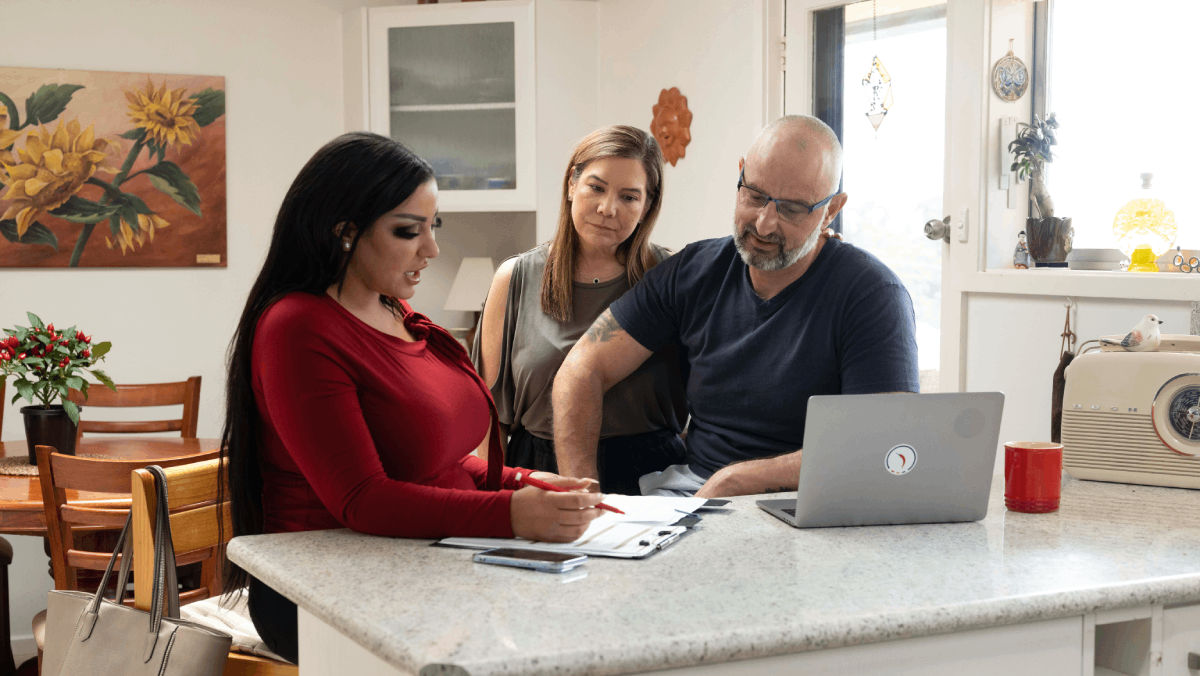What Can Make Property Values Go Down?

Estimated read time: 2 Minutes
A property valuation is an important step in a home loan application process as it determines the value of the property you’re using as security.
Although it may seem far-off in today's property market, not so long ago vendors were concerned with decreasing property prices. This can put stress on the economy and a sudden change in interest rates or external global activity could cause housing valuations to slide.
Like any free market, property prices are influenced by a number of macroeconomic factors and can both rise and fall in value on a regular basis. Core Logic publishes a daily home value index, tracking movements in prices across Australia’s capital cities.
Why does a valuation matter?
Lenders use the valuation of a property to work out how much money they're willing to offer - as a percentage of a property's total value - known as the Loan to Value Ratio (LVR).
The amount of a deposit you have will also affect your LVR as lenders calculate your LVR by dividing the amount you need to borrow by the value of the property. The more of a deposit you have, the less you will need to borrow for a home loan, thus your LVR will be smaller. An application with an LVR of above 80% may be considered higher risk by a lender which effectively increase the interest rate lenders can offer.
When your property valuation comes in lower than you expected, you may have trouble borrowing the amount you’ve applied for. In some cases, it could also mean there is an additional risk of losing your deposit or property, but there are some things you can do to avoid this.
Saving the deposit for your first place can be daunting. Most lenders won't talk to you unless you've saved up at least 10% of the property price, plus the money to cover government and legal fees. Many lenders also keep their best home loan deals for those who have at least a 20% deposit.
With today's house prices, that's some serious money that you'll need to save. You'll hear loan to value ratio or LVR a lot when you're comparing home loans. Thankfully, it's easy to understand. It's just the amount you need to borrow compared to the price you're paying for your property. So the larger your deposit, the lower the LVR.
This will determine what lenders you can apply to, what interest rates you'll be eligible for, and what risk fees you might have to pay.
Risk fees, yeah, you heard that right. If you're applying for a loan with an LVR above 80 which means you've got less than a 20% deposit, you'll often need to pay Lender's Mortgage Insurance or a similar risk fee. These fees can range from a few thousand dollars to tens of thousands of dollars depending on the lender and your property price.
This protects the lender in case you default on the loan and they need to sell the property at a loss. While there isn't any direct benefit to the borrower, it does mean you can get on the property ladder with a smaller deposit.
As you save more towards a property, the LVR decreases and home loans usually become more competitive. Say hello to better interest rates and lower or even no risk fees.
So if you want to get the lowest interest rate possible and avoid paying LMI or a similar risk fee then you'll usually need to save up at least a 20% deposit and have an LVR of 80.
However, with house prices rising, waiting to save up that extra deposit may see you priced out of the market, so you might consider it worth paying the extra fees to get your foot in the door sooner. You'll also need to keep some cash aside to pay for your legal and settlement fees, not to mention the cost of furnishing your property. It's a lot to weigh up. If you need any more hints and tips for your home loan journey then visit peppermoney.com.au. We're here to help.
What can you do if your valuation comes back low?
If you think that your property valuation seems too low, get back in touch with your lender to get more information so you can understand why the number is lower than you expected. If you are still not satisfied with the outcome, you can choose to send a formal (written) objection to a valuation through the relevant government agencies in your state:
Alternatively, if the low valuation leaves you with a fund gap - called a valuation shortfall, consider the following options in consultation with your financial advisor:
Tip: To be valuation-savvy, do your research. Collect the last 3 to 6 months of house sales data from the area to have a basic sense of what property is worth. It doesn’t replace a formal valuation but it can help you to be realistic about your own home (we tend to overvalue what we own) and to make sure you don’t commit more money than a property is worth. Our guide covers everything you need to know about property valuations.
Sign up to our newsletter
If you like this article, you'll love our monthly Real Lives newsletter.
View our Privacy Policy
Information provided is factual information only and is not intended to imply any recommendation about any financial product(s) or constitute tax advice. If you require financial or tax advice you should consult a licensed financial or tax adviser.
All applications for credit are subject to credit assessment, eligibility criteria and lending limits. Terms, conditions, fees and charges apply.
The results of the borrowing power calculator are based on information you have provided and is to be used as a guide only. The output of the calculator is subject to the assumptions provided in the calculator (see 'about this calculator') and are subject to change. It does not constitute a quote, pre-qualification, approval for credit or an offer for credit and you should not enter commitments based on it. The interest rates do not reflect true interest rates and the formula used for the purpose of calculating estimated borrowing power is based on the assumption that interest rates remain constant for the chosen loan term. Your borrowing power amount will be different if a full application is submitted and we complete responsible lending assessment. The results in the calculator do not take into account loan setup or establishment fees nor government, statutory or lenders fees, which may be applicable from time to time. Calculator by Widgetworks.
Pepper Money Personal Loans is a brand of Pepper Money Limited. Credit is provided by Now Finance Group Pty Ltd, Australian Credit Licence Number 425142 as agent for NF Finco 2 Pty Limited ACN 164 213 030. Personal information for Pepper Money Personal Loans is collected, used and disclosed in accordance with Pepper’s Privacy Policy & the credit provider’s Privacy Policy.
Pepper Money Limited ABN 55 094 317 665; AFSL and Australian Credit Licence 286655 (“Pepper”). All rights reserved. Pepper is the servicer of home loans provided by Pepper Finance Corporation Limited ABN 51 094 317 647. Pepper Asset Finance Pty Limited ACN 165 183 317 Australian Credit Licence 458899 is the credit provider for asset finance loans.
Pepper and the Pepper Money logo are registered trademarks of Pepper Group Assets (Australia) Pty Limited and are used under licence.




